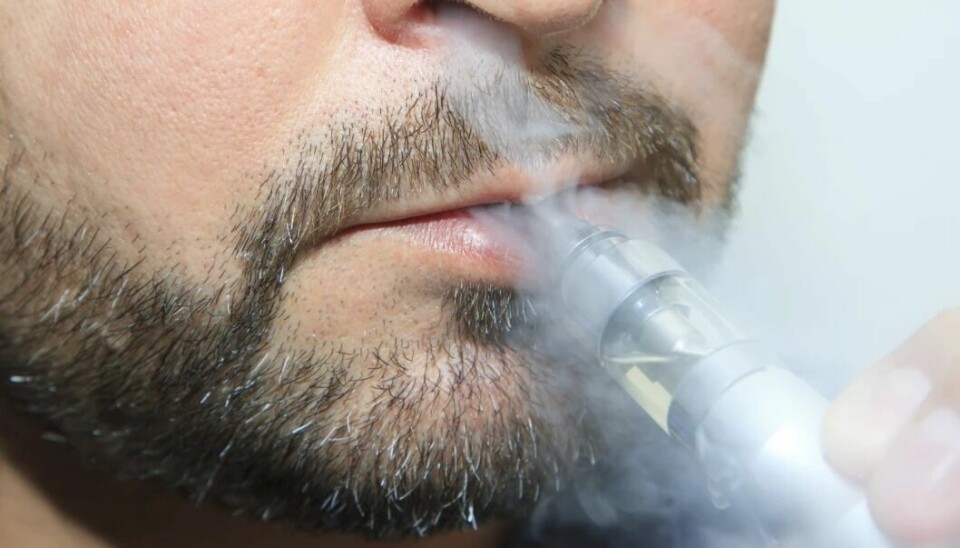
Researchers fear a ban on e-cigarettes could hinder people from quitting smoking
In Norway, the government plans to ban e-cigarettes with fruit and berry flavours. “We fear that the ban will lead to the purchase of dangerous e-cigarettes online,” Karl Erik Lund from the Norwegian Institute of Public Health says.
E-cigarettes are now surpassing snus as the most popular aid for Norwegians who want to quit smoking, according to a survey conducted by researchers at the Norwegian Institute of Public Health (NIPH).
Snus is a tobacco product in loose form or in sachets which are placed under the upper lip. It is primarily used in Norway and Sweden.
As many as 32 per cent of daily smokers would definitely or probably switch to e-cigarettes, according to the study.
The interest in switching to snus has decreased compared to before, with only 22 per cent of daily smokers considering snus as a viable alternative.
Only one in five respondents considered using nicotine medications such as nicotine patches and nicotine gum.
More appealing
E-cigarettes have become a much more appealing option for many smokers to satisfy their nicotine cravings.
This decline in interest in snus may suggest that snus is losing its appeal among those trying to quit smoking. Meanwhile, e-cigarettes might have an appealing potential among the remaining smokers.
This is according to senior researcher Karl Erik Lund, who is one of the researchers behind the study.

Much less harmful
But how dangerous are e-cigarettes compared to smoking cigarettes?
Everyone agrees that e-cigarettes are less dangerous and significantly less harmful, Lund tells sciencenorway.no.
However, the extent to which they are less dangerous is disputed.
According to the Royal College of Physicians, the potential harm from vaping e-cigarettes is only about 5 per cent of the harm caused by smoking cigarettes.
Others argue that it is impossible to determine precisely how much less the potential for harm is.
“But what is clear is that they do not have the combustion element that smoking cigarettes have, which makes regular smoking so dangerous,” Lund says.
The combustion in cigarettes releases harmful substances.
Prohibited in Norway
However, e-cigarettes are still prohibited for sale in Norway.
In 2016, the Norwegian Parliament (Storting) decided to lift the ban on nicotine-containing liquids, which e-cigarettes use.
“But this has never been implemented,” Lund explains.
The reason is unclear. According to the Ministry of Health and Care Services, this is because the decision must first be implemented in the EEA regulations.
Among the approximately 100,000 e-cigarette users in Norway, there is a widespread suspicion of delay or obstruction.
Now, former smokers who want nicotine through this alternative method either have to buy from Sweden or order online.
Proposed flavour ban
The Minister of Health and Care Services, Ingvild Kjerkol, now proposes to implement the lifting of the ban on nicotine-containing e-cigarettes, but to ban flavours. Only e-cigarettes with tobacco flavour would be allowed for sale.
Kjerkol has also suggested banning the online sale of all nicotine products, including e-cigarettes.
Therefore, Lund believes that the government is giving with one hand and taking away with the other.
“Most people use liquids with berry or fruit flavours,” Karl Erik Lund points out.
Senior researcher Lund and his colleague Tord Finne Vedøy now warn that this could have unintended consequences: It may hinder smokers’ motivation to switch from life-threatening cigarettes to a harm-reducing alternative.

Or, as they caution, those currently using flavoured e-cigarettes may be forced to use unsafe, black-market sources or, in the worst case, start mixing dangerous flavours themselves.
Proposed ban to prevent sales to minors
The Minister of Health and Care Services, Ingvild Kjerol, explains the decision as follows:
“Tobacco use is one of the main causes of early death and social health inequalities in Norway, so we need to reduce tobacco use. We want to introduce a ban on online sales of tobacco products and e-cigarettes to prevent sales to minors,” the ministry’s press office states on behalf of the minister.
Children must be protected from future addiction and health risks. The goal is for children born in 2010 and later to be a tobacco-free generation. Therefore, many of the measures in the government's tobacco strategy are aimed at children and young people.
“I do not share the concern that a ban on online sales will hinder smoking cessation. Most people who quit smoking do so without aids. The method with the best-documented effect is a combination of counseling and medication for smoking cessation,” Kjerkol tells sciencenorway.no through the ministry’s press office.
Better control through the ban
“E-cigarettes with nicotine will be legal to sell in Norway when the tobacco directive comes into force. We expect that to happen during 2023. Access to such products will therefore increase compared to the current situation,” Kjerkol points out.
“The ban on online sales will give the authorities better control over which products are imported from abroad, and we will consider a collaborative project between customs and health authorities to counter illegal tobacco trade,” she adds.
Young people use e-cigarettes sporadically
Senior researcher Karl Erik Lund understands well that politicians are concerned about the popularity of vaping among young people.
However, the vast majority of e-cigarette users are adults, and former smokers.
Among young non-smokers, the use of e-cigarettes is at a couple per cent. The usage is experimental and temporary. Most users use e-liquids without nicotine, according to Lund.
The addictive potential of e-cigarettes appears to be lower than smoking.
"Probably because nicotine uptake occurs more slowly and because nicotine, during combustion, interacts with substances that increase addiction," Lund says.
Safer to sell through specialty stores
Karl Erik Lund believes that consumer safety is best protected by limiting the sale of e-cigarettes to specialty stores. Here, age restrictions are carefully observed, and new users can receive important instructions from competent personnel.
Vape shops have become an important addition to smoking cessation assistance. They reach a segment of smokers who do not want to use the traditional aids recommended by the authorities, Lund says.
“It is better to have this under control, with sales in specialty stores,” he suggests.
Lund believes that the Norwegian Medicines Agency should approve flavoured e-cigarettes as they do with other medications for sale in approved stores.
Dangerous outbreak in the USA a few years ago
“In the worst-case scenario, some may start mixing flavours into nicotine liquids with only tobacco flavour themselves, and that can be life-threatening,” he emphasises.
He refers to the dramatic events in the USA a few years ago, where several young people lost their lives after inhaling additives from e-liquid sold online by drug dealers.
“The outbreak was not due to regular e-cigarette use, but the addition of a thickening agent that was supposed to make the cannabis liquid more potent. Inhalation resulted in acute lung injuries for the young users,” he explains.
Available on prescription in England
In England, health authorities have embraced e-cigarettes. Smokers who want to quit are recommended to use e-cigarettes. Doctors hand out e-cigarettes on prescription.
Smokers are offered e-cigarettes on prescription as part of the so-called Switch programme.
“This has made England one of the countries where e-cigarettes are most popular,” Lund says.
Snus has reduced smoking to record-low levels
So far, snus has been instrumental in keeping Norway at a record-low level of daily smokers in Europe.
In England, where there is no tradition of snus, e-cigarettes are now responsible for a rapid decline in smokers, Lund says.
They see a similar trend in New Zealand.
“On the other hand, in Australia, where the sale of e-cigarettes is illegal, the percentage of smokers remains steady, and the trade is conducted on the black market,” Lund points out.
He believes this shows the need to provide far less harmful substitutes for cigarette smoking to reduce the number of daily smokers.
———
Translated by Alette Bjordal Gjellesvik.
Read the Norwegian version of this article on forskning.no
Reference:
Vedøy, T.F. & Lund, K.E. How do Smokers in a Snus-Prevalent Society Consider E-cigarettes, Snus, and Nicotine Replacement Therapy Products as Relevant Replacements for Cigarettes in the Event They Should Stop Smoking?, Nicotine & Tobacco Research, 2023. DOI: 10.1093/ntr/ntad113
------







































